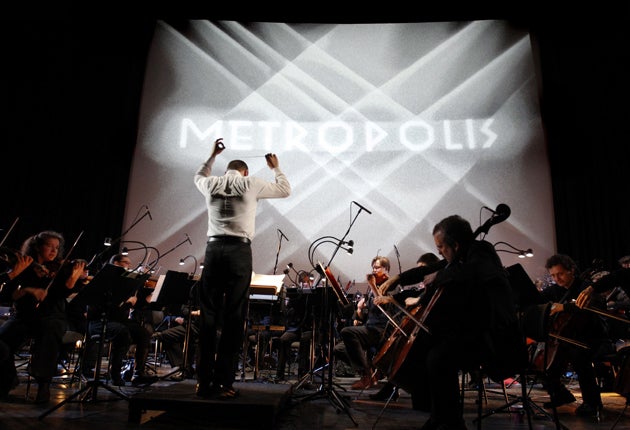First Night: Metropolis (uncut), Berlin Film Festival
After 83 years, a vision of Lang's masterpiece as he intended it

Your support helps us to tell the story
From reproductive rights to climate change to Big Tech, The Independent is on the ground when the story is developing. Whether it's investigating the financials of Elon Musk's pro-Trump PAC or producing our latest documentary, 'The A Word', which shines a light on the American women fighting for reproductive rights, we know how important it is to parse out the facts from the messaging.
At such a critical moment in US history, we need reporters on the ground. Your donation allows us to keep sending journalists to speak to both sides of the story.
The Independent is trusted by Americans across the entire political spectrum. And unlike many other quality news outlets, we choose not to lock Americans out of our reporting and analysis with paywalls. We believe quality journalism should be available to everyone, paid for by those who can afford it.
Your support makes all the difference.Throw away your Metropolis DVD! The version of Fritz Lang's sci-fi classic seen and admired by the world for nearly a century is far from the epic that the director originally envisioned.
The film was significantly altered and recut after its German premiere in 1927. Theatre managers used to screen films in strict 90-minute slots and would project Lang's original Metropolis at the wrong length. It was eventually cut by over 30 minutes for the international market and the full-length masterpiece was lost. But last night, 83 years after its first world premiere, the silent movie was shown just as Lang had intended it. The open-air gala screening on Berlin's beautiful FriedrichstadtPalast was accompanied by the Berlin Radio Symphony Orchestra playing its soundtrack, as part of the city's film festival.
Even in its edited form and with its many narrative jumps, Lang's tale about the struggle between the workers and the owners in a capitalist dystopia achieved classic status, largely because of its impressive production design, which drew on the popular art forms of the time, from German Expressionism to Art Deco and Modernism. Lang's metropolis became the template for other sci-fi cities, including such modern classics as Ridley Scott's Blade Runner. The ideas in the story's battle between technology and man have influenced the film version of The Wizard of Oz as well as 2001: A Space Odyssey , while doppelgängers, central to Metropolis's plot, have become a cinematic staple, notably in Hitchcock's Vertigo.
Yet, for all its magnificence, the Metropolis as we knew it was illogical in places and suffered as a result. For years audiences have wondered how good this film might have been had it not been edited. It turns out that it's better than anyone could ever have expected. In 2008 an original but heavily damaged cut of the movie was found in the Museo del Cine in Buenos Aires. The extra footage (totalling 30 minutes) had been transferred to 16mm so the new scenes could not be restored to the same aspect ratio of the 35mm original. Consequently, in the latest restored version there is a slight resizing of the picture when the newly inserted scenes are shown and they are marked with black lines, in contrast to the pristine restoration of 35mm footage. This does not detract from the overall film. Holes in the story have been plugged and the added footage rachets up the tension dramatically. There are far more reaction shots throughout, whole new sequences and a fresh pacing which emphasises the feeling of the perils to come.
The first major new scene appears after Freder (Gustav Fröhlich), the son of the broken-hearted leader of the city Joh Fredersen (Alfred Abel), has fallen in love with Maria (Brigitte Helm). Freder discovers how terrible life is for the workers inhabiting the underground city and gives his clothes to a tired worker, Georgy 11811. Now, as Georgy heads to the red-light district there's a riotous montage sequence and a quote from Oscar Wilde, "The only way to resist temptation is to yield to it". The Thin Man, a Grim Reaper-like figure employed to spy on Freder by his father, appears frequently in this section and adds to the sense of impending death. But it's in the second half that the extra footage really elevates Metropolis. The addition of biblical references brings the spiritual-vs-science battle to the forefront.
Only one scene was too heavily damaged to restore, but intertitles explain how Fredersen discovered the dastardly plan of the mad scientist to use the robot he has been asked to build for his own ends. The film now feels suitably epic and tense throughout. My only gripe had nothing to do with the movie – simply that the lighting needed by the marvellous Berlin Radio Symphony Orchestra diluted the sharpness of Lang's stunning picture.
Join our commenting forum
Join thought-provoking conversations, follow other Independent readers and see their replies
Comments